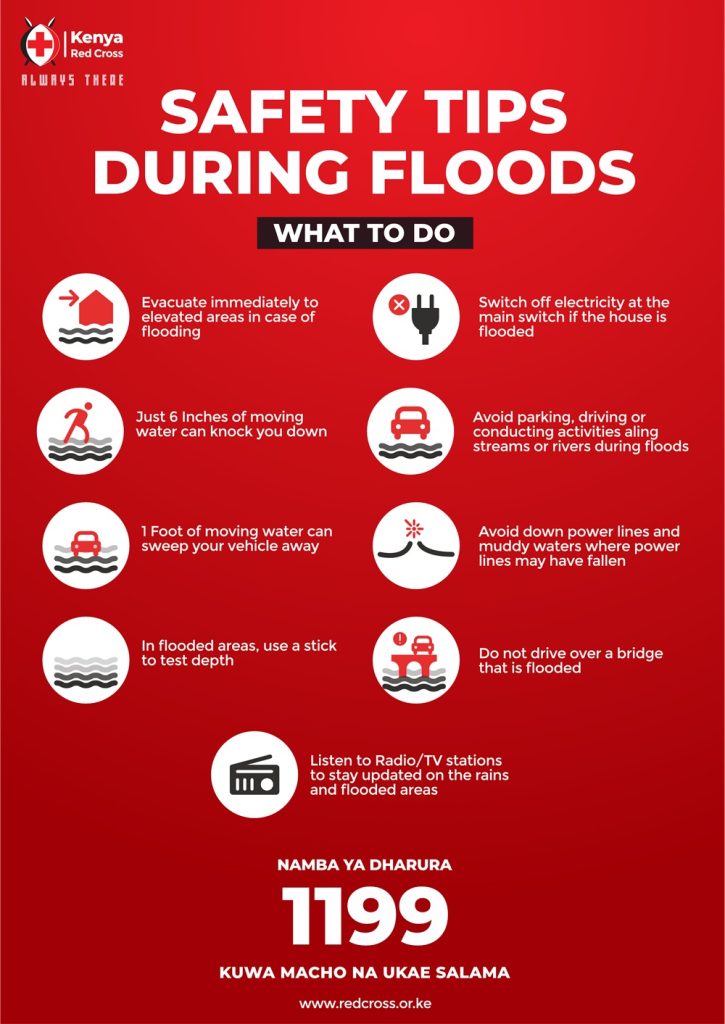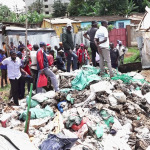10,144 households have been displaced in the last 24 hours by the heavy rains and flooding witnessed in most parts of the country.
According to the Kenya Red Cross Society analysis, 23 counties are adversely affected with approximately 27,716 acres of arable land having been submerged, 206 businesses affected, 14 roads destroyed, 18 schools affected and 4,795 livestock deaths reported.
Kenya’s meteorological department has warned the country will this week experience very high rainfall and asked people to prepare for floods.
As a result, KRCS projects more displacements affecting 30,000 households in at least 26 high-risk Counties.
“Drowning incidents are anticipated to rise, and an upsurge of water and vector-borne related diseases are likely to be reported in areas experiencing floods and flash floods. The KRCS Emergency Operations Centre is monitoring and conducting continuous situation analysis to inform preparedness and response actions, and provide search and rescue operations” it said in the report.
Since the onset of March-April-May rainfall, 23 counties of Tana River, Nyeri, Murang’a, Meru, Kiambu, Kirinyaga, Kajiado, Machakos, Nairobi, Garissa, Bungoma, Turkana, Baringo, Nakuru, Narok, Isiolo, Marsabit, Busia, Homabay, Kisumu, Migori and Siaya have reported flood effects.
In Machakos County, River Athi broke its banks affecting households in Kinanie, Joska and Kamulu areas, while in Nairobi County, River Ngong and Nairobi River broke their banks resulting in flash floods in Kibra, South C, South B, Mukuru Kwa Njenga, Mukuru Kayaba, Reuben, Kawangware, Mathare, Viwandani and Kilimani.
Additionally, Masinga and Kiambere dams have experienced an overflow. As of today, Masinga dam is at 1057.2 m AMSL (above mean sea level) which is above its limit of 1056.5 m AMSL, while Kiambere dam is at 700.63m AMSL which is above its limit of 700.0m AMSL.
The society has further listed significant infrastructural damage in Samburu affecting Maralal-Isiolo Road at Basilinga, Kangundo Road at Stage 26 and Langata Road at T-mall in Nairobi.
Others are Banana Ruaka Road at Kigwani in Kiambu county, Kamulu- Joska Bridge in Machakos, Namanga Road at Kitengela in Kajiado and a section of Nyali link Road in Mombasa.
Besides intensified rescue efforts, the organization has undertaken emergency interventions which include distribution of food and non-food items, health outreaches and relentless risk communication campaigns to keep vulnerable residents informed.
“The interventions have so far sent out 19 million tera messages country-wide, rescued 188 people, established 49 displaced camps, supported 364 households with food items, and 1,425 people reached by health outreaches. The teams have also distributed 20,291 Water, Sanitation and Hygiene (WASH) Non-Food Items (NFIs) to the affected regions” the society said.
Although the number of fatalities was not disclosed, several deaths and injuries have been reported across the country.
The rainy season is expected to reach its peak towards the end of April and subside in June, according to the meteorology department.
This week, the heavy rainfall is likely to be accompanied by gusty winds, large ocean waves (along the coastal strip counties), and strong southerly winds in the Southeastern region.
Large waves may affect marine activities whereas flood waters may appear in places where it has not rained heavily, especially downstream.
KRCS safety guidelines for flooding.






